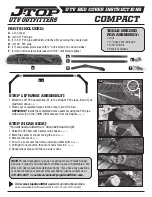
Premium System — If Equipped
The TPMS uses wireless technology with wheel rim
mounted electronic sensors to monitor tire pressure lev-
els. Sensors, mounted to each wheel as part of the valve
stem, transmit tire pressure readings to the receiver
module.
NOTE:
It is particularly important for you to check the
tire pressure in all of your tires regularly and to maintain
the proper pressure.
The TPMS consists of the following components:
•
Receiver Module
•
Four Tire Pressure Monitoring Sensors
•
Various Tire Pressure Monitoring System Messages,
which display in the Electronic Vehicle Information
Center (EVIC) or Driver Information Display (DID)
•
Tire Pressure Monitoring Telltale Light
Tire Pressure Monitoring Low Pressure Warnings
The Tire Pressure Monitoring Telltale Light will illumi-
nate in the instrument cluster and an audible chime will
be activated when one or more of the four active road tire
pressures are low. The audible chime will sound once
every ignition cycle for the first condition that it detects.
In addition, the EVIC/DID will display a “Inflate Tire to
XX” message for a minimum of five seconds and a
graphic of the pressure value(s) with the low tire(s)
displayed in a different color. The recommended cold
placard pressure inflation value is the pressure value
displayed in the
⬙
Inflate Tire to XX
⬙
message displayed in
the EVIC/DID.
Should a low tire condition occur on any of the four
active road tire(s), you should stop as soon as possible
and inflate all tires that are in a different color on the
514
STARTING AND OPERATING
Summary of Contents for 2016 Dart
Page 4: ......
Page 7: ...1 INTRODUCTION 5 ...
Page 10: ......
Page 77: ...Not Seated Properly Not Seated Properly 2 THINGS TO KNOW BEFORE STARTING YOUR VEHICLE 75 ...
Page 162: ...160 UNDERSTANDING THE FEATURES OF YOUR VEHICLE ...
Page 163: ...3 UNDERSTANDING THE FEATURES OF YOUR VEHICLE 161 ...
Page 164: ...162 UNDERSTANDING THE FEATURES OF YOUR VEHICLE ...
Page 201: ...Voice Tree 3 UNDERSTANDING THE FEATURES OF YOUR VEHICLE 199 ...
Page 216: ...Voice Tree 214 UNDERSTANDING THE FEATURES OF YOUR VEHICLE ...
Page 218: ...216 UNDERSTANDING THE FEATURES OF YOUR VEHICLE ...
Page 220: ...218 UNDERSTANDING THE FEATURES OF YOUR VEHICLE ...
Page 222: ...220 UNDERSTANDING THE FEATURES OF YOUR VEHICLE ...
Page 224: ...222 UNDERSTANDING THE FEATURES OF YOUR VEHICLE ...
Page 266: ...One Half Second Tone Slow Tone 264 UNDERSTANDING THE FEATURES OF YOUR VEHICLE ...
Page 267: ...Slow Tone Fast Tone 3 UNDERSTANDING THE FEATURES OF YOUR VEHICLE 265 ...
Page 268: ...Fast Tone Fast Tone 266 UNDERSTANDING THE FEATURES OF YOUR VEHICLE ...
Page 306: ......
Page 423: ...Operating Tips Chart 4 UNDERSTANDING YOUR INSTRUMENT PANEL 421 ...
Page 424: ......
Page 494: ...492 STARTING AND OPERATING ...
Page 586: ......
Page 647: ...MAINTENANCE SCHEDULES CONTENTS 䡵 MAINTENANCE SCHEDULE 646 Required Maintenance 647 8 ...
Page 654: ......
Page 666: ......
Page 667: ...INDEX 10 ...
















































